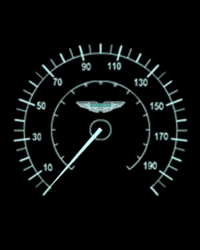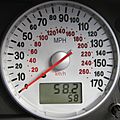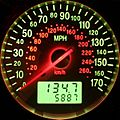Speedometer facts for kids

A speedometer is a type of gauge that shows the speed a vehicle is moving. It usually shows the speed in miles per hour (mph) for countries that use the statute mile for distances or Kilometres per hour (kph) for countries that use the metric system. Originally, a speedometer was an option that car owners could buy to put on their car. Beginning about 1910 it was built into all cars.
History
The electric speedometer was invented by the Croatian Josip Belušić in 1888, and was originally called a velocimeter. Charles Babbage is credited with creating an early type of a speedometer. These were usually fitted to locomotives.
A speedometer was patented by a German, Otto Schulze on October 7, 1902, it uses a rotating flexible cable usually driven by gearing linked to the output of the vehicle's transmission. The early Volkswagen Beetle and many motorcycles, however, use a cable driven from a front wheel.
Speedometer accuracy
Most speedometers have tolerances of some ±10%, mainly due to variations in tire diameter. Sources of error due to tire diameter variations are wear, temperature, pressure, vehicle load, and nominal tire size. Vehicle manufacturers usually calibrate speedometers to show the vehicle is going faster.
Underinflation
When a tire has less air pressure than it should, it is underinflated. Underinflation causes excessive heat and reduces the diameter of the tires. This causes it to rotate faster than the speedometer shows it is. Tires underinflated by only 10 psi can mean a car or truck reading 70 mph on the speedometer is actually traveling at 72 mph.
Images for kids
-
A modern speedometer in a Toyota Corolla
-
A digital, LCD speedometer in a Honda Insight
-
A speedometer showing mph and km/h along with an odometer and a separate "trip" odometer (both showing distance traveled in miles)
See also
 In Spanish: Velocímetro para niños
In Spanish: Velocímetro para niños





